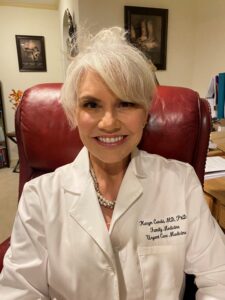How Healthcare Leaders Can Improve Workforce Morale, According to Karyn Condie, MD
 When the pandemic took hold in early 2020, there was a lot of uncertainty and unknowns. Caring for patients with COVID-19 was new and evolving. Research into preventive measures such as vaccines became a priority. Frontline physicians were treating patients in this general uncertainty as well as continuing with their “normal everyday” workload. For many, this meant attending empaneled patients and their needs while assisting with COVID-19 efforts. This was time consuming and stressful.
When the pandemic took hold in early 2020, there was a lot of uncertainty and unknowns. Caring for patients with COVID-19 was new and evolving. Research into preventive measures such as vaccines became a priority. Frontline physicians were treating patients in this general uncertainty as well as continuing with their “normal everyday” workload. For many, this meant attending empaneled patients and their needs while assisting with COVID-19 efforts. This was time consuming and stressful.
COVID-19 has impacted schools, work, businesses, and families. So, while physicians have been busy in the field, their homelife has been disrupted due to COVID-19. The inability for frontline physicians to be present for kids and family due to duties in the field is a heavy burden and makes it very difficult to maintain focus. Physician burnout presents in a number of ways. Excessive stress about family, finances, and restrictions, the inability to attend needed training sessions, and worry about becoming sick are only a few of many symptoms.
It doesn’t help that physicians are probably harder on themselves than they need to be. Thinking that “this is your job,” “you should be able to handle this,” and “people are depending on me” are some of the sentiments expressed by physicians during the pandemic. Excessive worry about schedules and work/life balance during the pandemic was another huge factor in decreased morale among physicians.
Low morale can lead to costly workforce turnover and poor patient care. Already, many physicians have left the direct patient care arena to practice telemedicine or seek administrative positions. It’s no surprise that the pandemic increased telemedicine and virtual appointments. This new medical paradigm has allowed physicians to remain at home with their families and have a more controlled, scheduled patient environment. While this has increased access to physicians via virtual care, it has also decreased the number of experienced providers in the field.
Healthcare leaders need to be aware of the issues, both personal and professional, that affect their physician staff. Including clinical physicians in decision-making processes, such as scheduling, will help to remove communication barriers and ensure that the workplace remains inclusive and attentive to staff and patients alike. Allowing physician input in the day-to-day clinic functions will improve the workday experience. In effect, patient care needs to be in the hands of the patients and their physicians, with support and assistance from administrators.
As healthcare leaders, we must stay educated and knowledgeable about the latest treatment protocols. We must also practice what we know to be safe and effective preventive measures. Finally, we need to take care of each other. Many physicians compartmentalize and do not discuss or address situations or issues that may be impacting our personal lives and professional practice. It is essential, especially during this pandemic, to be aware and empathetic, and remain supportive of our colleagues.
Dr. Karyn Condie currently serves on the governing board of the American Board of Administrative Medicine, a Member Board of the American Board of Physician Specialties (ABPS). She is a board-certified physician in administrative medicine and disaster medicine by the ABPS.






